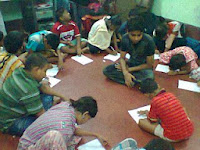Vartanama, Oct '13
By Pawan Dhall
As we continue exploring stories around intimate dreams and diversity in sex, gender, love, sexual attraction, friendship, family structures, personal identity and life aspirations through each issue of Varta, the question that arises every time is what theme to focus on. From the collection of articles in this issue, it may seem like one without any specific theme. If so, why talk about ‘male buts’ or ‘male butts’, and why think about ‘surviving’ them?
By Pawan Dhall
As we continue exploring stories around intimate dreams and diversity in sex, gender, love, sexual attraction, friendship, family structures, personal identity and life aspirations through each issue of Varta, the question that arises every time is what theme to focus on. From the collection of articles in this issue, it may seem like one without any specific theme. If so, why talk about ‘male buts’ or ‘male butts’, and why think about ‘surviving’ them?
First, about male butts – there are many sorts and for
different people they may evoke different reactions – admiration, desire or
lust, envy, derision and even humour. True, that this also applies to female
butts, but then female butts have probably been more talked about and commented
on than male ones, and isn’t it important to even out this difference?









